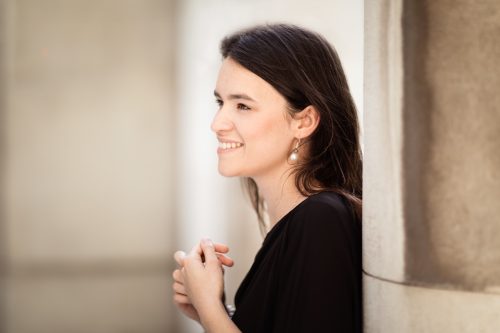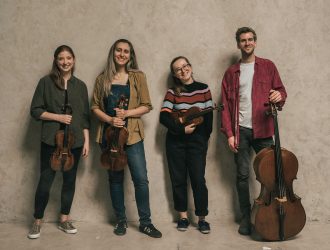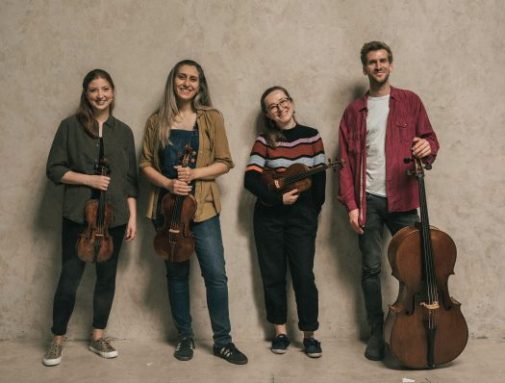 United Kingdom Music at Paxton – Summer Festival of Chamber Music 2024 [3]: Picture Gallery, Paxton House, Scottish Borders, 20 & 21.7.2024. (MC)
United Kingdom Music at Paxton – Summer Festival of Chamber Music 2024 [3]: Picture Gallery, Paxton House, Scottish Borders, 20 & 21.7.2024. (MC)

Consone Quartet (period instruments): Agata Daraškaitė (violin), Magdalena Loth-Hill (violin), Elitsa Bogdanova (viola) and George Ross (cello)
20.7.2024 – Song Recital with String Quartet: Helen Charlston (mezzo-soprano), Consone Quartet.
Clara Schumann – Six Songs, Op.13 (1844)
Robert Schumann – String Quartet in F major, Op.41/2 (1842)
Felix Mendelssohn – Die Liebende schreibt, Op.86/3 (1831); Auf Flügeln des Gesanges, Op.34/2 (1834)
Fanny Mendelssohn – Die Mainacht (1838)
Robert Schumann – Frauenliebe und -leben, Op.42 (1840)
(All songs arranged for voice and string quartet by Bill Thorp)
A song recital at Paxton is certainly an event to anticipate with pleasure. I rarely get the opportunity to attend such song (lieder) recitals yet, only a month ago, I reported on a recital of Robert Schumann and Brahms given by German baritone Matthias Goerne at the Dresden Music Festival. A consistently successful feature of Music at Paxton has been the choice of singers. At this recital, Londoner Helen Charlston a mezzo-soprano was accompanied by the Consone Quartet instead of the usual solo piano. All the songs were arranged for voice and string quartet by Bill Thorp who was in the audience.
Prize-winning soloist Charlston studied at Trinity College, Cambridge. She also participated on the Pembroke College Lieder Scheme and became a BBC New Generation artist. Notably she won the 2023 BBC Music Magazine Vocal Awards with her recording Battle Cry – She Speaks, an album of baroque heroines and tragediennes; with Toby Carr (theorbo) on Delphian.
The Consone Quartet became the Music at Paxton Associate Ensemble in 2023 and were formed at the Royal College of Music, London in 2012. The Consone Quartet takes its name from the Latin word consone meaning in English accord, harmony, unison. In 2019 Consone became the first period instrument string quartet to be selected as BBC New Generation Artists, a valued two-year scheme that I know can greatly assist artists in the early stages of their performing career.
As to the theme for this recital programme it was easy to imagine these works as part of a music soirée given by brother and sister Felix and Fanny at the Mendelssohn’s large family home. As friends of the Mendelssohn’s, Clara and Robert Schumann might also have attended and have their works performed.
Charlston opened the recital with Clara Schumann’s Sechs Lieder (Six Songs), Op.13. A celebrated pianist Clara would often include her settings in her programmes. Clara’s set of songs have a lovely sonority and an effective blend between voice and accompaniment. Using lyrical texts by some of the great romantic German poets Emanuel Geibel, Heinrich Heine and Friedrich Rückert, Clara in her Op.13 songs chose settings concerning love, parting, loss and nature that were highly romanticised often excessively ripe. In these texts romantic archetypes abound. My favourite Charlston performance here was the setting of Geibel text Der Mond kommt still gegangen (The moon so peaceful rises). Conveying introspection so well, Charlston resisted over sentimentality, and added a more serious tone to the final verse.
Sadly, I don’t get the chance of attending recitals playing any of Robert Schumann’s string quartets as often as I would like. All three quartets were written during the summer of 1842. Owing to this relative neglect I am glad the Consone Quartet chose to play the Schumann String Quartet in F major, No.2, a lyrical work where fantasy seems to compete with realism. With skilled playing and concentration, Consone journeyed thoughtfully through Schumann’s tormented world. A cohesive group Consone conveyed pleasing intonation from its period instruments given the level of tuning required between movements in the warm picture gallery. For my money the opening movement marked Allegro vivace stood out for the squally mood of the writing where the rich sound of the instruments became very noticeable. The following movement Andante, quasi Variazioni with its aching passion felt like a love-letter in music and stood out for such top-drawer playing.
Interval over Charlston turned her attention to two of Felix Mendelssohn’s songs. The mezzo-soprano’s voice was most assured and resolute with Mendelssohn’s setting to a Goethe text Die Liebende schreibt (The Beloved Writes) concerning the power of love. Even better was Charlston’s delivery of the second song Auf Flügeln des Gesanges (On Wings of Song) a Heine love poem set on the banks of the River Ganges. Much admired and recorded often this is one of Felix’s finest settings and Charlston’s smooth tone blended gloriously with Heine’s dreamy verse. Fanny Mendelssohn is represented by a single song Die Mainacht (Night of May), her setting of a Ludwig Hölty poem. With nature themes in the verse representing longing and isolation Charlston sang gracefully providing a real sense of empathy to the text.
Charlston’s final set of songs was Robert Schumann Frauenliebe und -leben (A Woman’s Love and Life), Op.42. This cycle of eight lyrical songs are settings of text by Adelbert von Chamisso. As the cycle progresses the heroine falls in love, becomes engaged, marries and bears a child. In the concluding setting there was the agony of the grief of death. Outstanding singing here by Charlston and especially well performed was the penultimate setting An meinem Herzen, an meiner Brust (On my heart, at my breast) as the mother weeps joyfully at suckling her new baby.
In this delightful recital with string quartet, Charlston with her creamy toned voice was assured and relished the challenges of the settings, especially the more intimate texts. This repertoire didn’t provide her with too many opportunities to demonstrate both her high register and strength of her voice, but when she did the effect was most satisfactory. Charlston displayed excellent diction and persuasive phrasing, providing a level of expression that demonstrated her attention to the meaning of the text. Bill Thorp’s song arrangements for string quartet used by the Consone enhanced my enjoyment of the settings.

21.7.2024 – Consone Quartet.
Mozart – String Quartet No.20 in D major, K499 ‘Hoffmeister’ (1786)
Beethoven – String Quartet No.11 in F minor, Op.9 ‘Serioso’ (1810)
The Consone Quartet led by Agata Daraškaitė continued its festival participation with a morning recital: performing successfully two masterworks of the romantic chamber music repertoire by Mozart and Beethoven certainly delighted the audience.
First Consone opened the recital with Mozart’s String Quartet No. 20 in D major, K499 from 1786. Written at Vienna the D major score was intended to be part of a set that didn’t happen. Its title ‘Hoffmeister’ refers to Mozart’s friend the patron and publisher Franz Anton Hoffmeister. Musicologist Alfred Einstein judged the ‘Hoffmeister’ as ‘despairing under a mask of gaiety’. The four-movement ‘Hoffmeister’ is a favourite quartet of mine, and I was gratified that Consone provided an engaging performance that recognised this as a proud and dignified work. Especially agreeable was the feeling of civility and satisfaction imbued in the winsome Menuetto and Trio. Notable too was the way Consone expertly communicated a rather sombre mood to the Adagio. Here I savoured the steadfast playing of the prominent cello part.
After the interval Consone played the Beethoven String Quartet No.11 in F minor, Op.95 known as the ‘Serioso’. In the case of this Beethoven F minor Quartet the composer himself appended the title ‘Serioso’ to the manuscript. Written in 1810 and in four movements the ‘Serioso’; is a minor key quartet a product of his middle period and not part of a set. It is Beethoven’s shortest string quartet and feels like a compressed work pared down to the bare necessities. Likely the reason for the choice of name is the word ‘serioso’ in the tempo designation of the third movement. Beethoven was cited to have said he wanted to keep the ‘Serioso’ for a small group of friends and not for public performance.
Clearly absorbed in this progressive work Consone played resolutely. It seemed its focus was to delve as closely as possible to the music’s core. Particularly successful movements included the stormy Allegro con brio where Consone provided weight and earnestness. Conspicuous too was the stark beauty given to the Allegretto ma non troppo, redolent of a solemn prayer of an individual isolated from human contact. Full marks are due to Agata Daraškaitė for leading the quartet with such unfailing proficiency.
21.7.2024– String Sextet Recital: Consone Quartet with Francesca Gilbert (viola) and Alexander Rolton (cello).
Gavin Bryars – String Sextet ‘The Bridges of Königsberg’ (Scottish première)
Richard Strauss – Prelude to Capriccio, Op.85
Mozart – Grande Sestetto Concertante (1808 arrangement of Sinfonia Concertante, K.364)
For this evening recital of three works for string sextet the Consone Quartet were joined by violist Francesca Gilbert and cellist Alexander Rolton a combination that created a gloriously rich string sound.
Scottish composer Gavin Bryars celebrated his eightieth birthday in 2023 and several of his works have been performed. Last year I reported on a production of Bryars’s chamber opera Marilyn Forever at the Royal Conservatoire of Scotland, Glasgow (review click here).
Interest in Bryars’s music has continued and the augmented Consone Quartet opened the recital with a Scottish premiere of Bryars’s String Sextet ‘The Bridges of Königsberg’. Bryars’s title concerns the ‘Königsberg Bridge problem’ a historically notable mathematical puzzle. In addition, Bryars mentions the sextet has a connection to a chamber opera that he had been keen to undertake based on Thomas de Quincey’s The Last Days of Immanuel Kant a biography of German philosopher Immanuel Kant (1724-1804) who lived all his life in Königsberg, Prussia, now Kaliningrad.
Bryars has likened his String Sextet to ‘a conversation between a quartet and two other instruments’. The premiere was given at Syde, Gloucestershire in 2023 the year of Bryars’s eightieth birthday. Then the Consone Quartet was augmented by violist Renée Hemsing and cellist Guy Fishman.
Immediately the radiant sound of the string sextet evoked a wash of sound gently changing and shifting in waves through the room. Modifications of weight and intensity are barely perceptible. Soon this listener was drawn into the soundworld of a calming balm. I did sense that a slight anxious edge was never too far away, without fully appearing. Gavin Bryars was in the audience, and he took a well-deserved bow.
Richard Strauss gave his final opera Capriccio the subtitle ‘A conversation piece for music in one act’. Written for a string sextet of orchestra members the music of the Prelude, continues into the first scene and has become a much-admired part of Capriccio. This Prelude is most frequently performed outside the opera in a chamber music setting. It is a sterling work with lovely melodies, a festival highlight, that some will find toothsome yet there is nothing wrong with that. The Consone Quartet seemed at home with Strauss’s passionate and intense string writing. Although the sextet is a relatively small group, the phrasing and tone of the Consone strings produced a sound that was richer and fuller than I expected.
Mozart, who was proficient on both violin and viola, wrote his highly regarded Sinfonia concertante in E-flat for violin, viola and orchestra, K. 364 in 1779 at Salzburg. To conclude its recital Consone performed a splendid 1779 transcription of the Sinfonia concertante named the Grande Sestetto Concertante for string sextet, by an unknown author, using a new edition edited by Christopher Hogwood.
Striking was the impressive interplay between the solo violin of Agata Daraškaitė and violist Elitsa Bogdanova, and the way the duo interacted with the other strings. The performance of the attractive opening movement Allegro maestoso was joyful in spirit, in the plaintive Andante an intensity was maintained entirely, and the Presto: Finale was delivered with unerring vivacity. Throughout Mozart’s Concertante the performance of the Consone (now) Sextet was alive with energy and the audience responded with loud applause.
Michael Cookson
